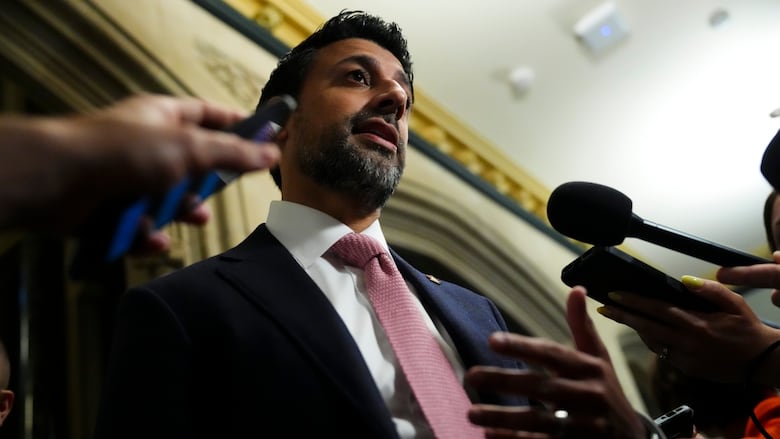Canada wants new trade partners. But markets like India and China come with major obstacles
International trade minister says there's a global appetite for more trade with Canada

International Trade Minister Maninder Sidhu says Canada has a chance to build new partnerships as U.S. tariffs continue to pummel world economies. But landing deeper ties with major markets like the U.K., India and China means overcoming irritants and fraught diplomatic relationships.
"There's an appetite with partners and allies all around the world to do more with Canada," Sidhu said in an interview with CBC's The House. "There is an opportune window that we have to jump on."
Sidhu told guest host Janyce McGregor that success to him is "getting businesses more comfortable dealing with overseas markets."
He said Canada "should be screaming at the top of our lungs" about what it can offer the world.
Since becoming minister of international trade, Sidhu has helped Canada deepen its trade relationship with countries like Ecuador and the United Arab Emirates.

But larger markets like the United Kingdom, India and China that could play a big role in easing Canada's reliance on the U.S. are much more complicated. Canada has tried to deepen its economic ties with these countries before, but trade discussions either fizzled out or diplomatic tensions stymied discussions.
In January 2024, the British government walked away from trade negotiations. A major sticking point was how much tariff-free access U.K. producers should have to the Canadian cheese market.
Sidhu said the U.K. "is an important partner for Canada" and he met with his counterpart, British Secretary for Businesses and Trade Jonathan Reynolds, to discuss how to build up Canada-U.K. relations.

When asked whether Canada's new law to protect supply management is blocking the U.K. from returning to trade discussions, Sidhu said Canada "has always remained at the negotiating table," the Liberal government will "never dismantle supply management" and that he wants to focus on trade "opportunities."
There are signs of progress. In May, British High Commissioner Rob Tinline said the U.K. wants Canada to put forward a bill ratifying its accession to the Comprehensive and Progressive Agreement for Trans-Pacific Partnership.
Weeks later, Ottawa announced plans to do so this fall, allowing the British to enjoy trade with Canada under the terms of that agreement.
Deepening ties with India, China
During the G7 summit, Carney and Indian Prime Minister Narendra Modi agreed to designate new high commissioners.
Both countries expelled top diplomats after the RCMP accused agents of the Indian government of playing a role in "widespread violence" in Canada, including homicides.
When asked whether he sees a path for trade talks to resume between Canada and India, Sidhu said his constituents and Canadians at large are asking for "more connectivity between Canada and India."
Sidhu also said trade and other business-to-business dealings have "been continuing over the last number of years on an upward trajectory."
He said the government is taking a "step-by-step approach," and that restoring diplomats is an important step.
Canada has also been making trade moves with China. Sidhu said the two countries have agreed to convene the Joint Economic and Trade Commission "to work through some of these issues and problems."

In March, China announced it would apply tariffs on Canadian agricultural and food products as retaliation against levies Ottawa introduced last year on Chinese-made electric vehicles, steel and aluminum.
China applied a 100 per cent tariff on Canadian canola oil, oil cakes and pea imports, and a 25 per cent duty on Canadian aquatic products and pork.
Sidhu said he sees an openness to addressing Canada-China trade issues "and so we'll continue building on that. But the first part is to have those conversations being started…
"Diplomacy can do wonders and we need to make sure that we're able to have those conversations with countries around the world. And that's exactly what I'll be doing."
With files from Janyce McGregor

